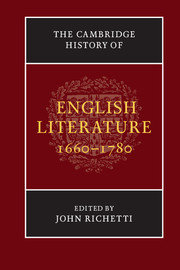Book contents
- Frontmatter
- Introduction
- PART I LITERARY PRODUCTION AND DISSEMINATION: CHANGING AUDIENCES AND EMERGING MEDIA
- PART II LITERARY GENRES: ADAPTATION AND REFORMATION
- PART III LITERATURE AND INTELLECTUAL LIFE: THE PRODUCTION AND TRANSMISSION OF CULTURE
- PART IV LITERATURE AND SOCIAL AND INSTITUTIONAL CHANGE
- 20 The eighteenth-century periodical essay
- 21 Public opinion and the political pamphlet
- 22 Sentimental fiction: ethics, social critique and philanthropy
- 23 Folklore, antiquarianism, scholarship and high literary culture
- PART V LITERARY GENRES: TRANSFORMATION AND NEW FORMS OF EXPRESSIVENESS
- PART VI CONCLUSION
- Chronology
- Bibliographies
- Index
- References
22 - Sentimental fiction: ethics, social critique and philanthropy
from PART IV - LITERATURE AND SOCIAL AND INSTITUTIONAL CHANGE
Published online by Cambridge University Press: 28 March 2008
- Frontmatter
- Introduction
- PART I LITERARY PRODUCTION AND DISSEMINATION: CHANGING AUDIENCES AND EMERGING MEDIA
- PART II LITERARY GENRES: ADAPTATION AND REFORMATION
- PART III LITERATURE AND INTELLECTUAL LIFE: THE PRODUCTION AND TRANSMISSION OF CULTURE
- PART IV LITERATURE AND SOCIAL AND INSTITUTIONAL CHANGE
- 20 The eighteenth-century periodical essay
- 21 Public opinion and the political pamphlet
- 22 Sentimental fiction: ethics, social critique and philanthropy
- 23 Folklore, antiquarianism, scholarship and high literary culture
- PART V LITERARY GENRES: TRANSFORMATION AND NEW FORMS OF EXPRESSIVENESS
- PART VI CONCLUSION
- Chronology
- Bibliographies
- Index
- References
Summary
It is among the paradoxes of the lachrymose fiction that bedewed the eyes of novel readers in the later eighteenth century that the foremost exponents of the sentimental mode were also its most cogent detractors. The prime example is Henry Mackenzie, whose much-reprinted The Man of Feeling (1771), with its successors The Man of the World (1773) and Julia de Roubigné (1777), made him the most fashionable novelist of his day. With its trembling alertness to the minutiae of suffering and sympathy, and the plaintive silences of its fractured narrative form, The Man of Feeling is the exemplary sentimental text. Yet Mackenzie was to retire from novel writing in his early thirties, and in an essay of 1785 he gave systematic development to anxieties about sentimental fiction and its ethical basis that had already quietly haunted his three novels. Surveying the emergent subgenres of fiction, he detects in ‘that species called the Sentimental’ a dangerous subversion of its central claim: that by engaging readers' sympathies with misfortune, it could activate, as well as merely represent, ‘the most exalted benevolence’. Feeling had become an end in itself, narcissistically attentive to nothing more than its own exquisiteness. Deploring the inertia of ‘refined sentimentalists … who open their minds to impressions which never have any effect upon their conduct’, Mackenzie attributes to sentimental fiction a ‘separation of conscience from feeling’ which is, he adds, ‘a depravity of the most pernicious sort’. Even in its foremost examples, it cultivates nothing better than self-admiration, and disengages the will from forms of practical action that only less modish virtues – duty, principle – have the power to impel.
- Type
- Chapter
- Information
- The Cambridge History of English Literature, 1660–1780 , pp. 572 - 601Publisher: Cambridge University PressPrint publication year: 2005
References
- 9
- Cited by



